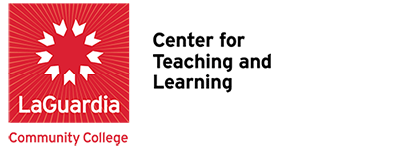
The Designing for All (D4A) Project
From June 2017–June 2018, the Designing for All (D4A) project brought together a team of students, staff, and faculty to support and educate LaGuardia faculty to use Universal Design concepts for making learning materials available for students with disabilities. Designed as a pedagogy and classroom practice project, we adopted two overarching goals:
- Ensure that every student has access to the learning materials they need, and
- Provide a welcoming learning environment for every student at LaGuardia Community College.
Though we knew it would not be possible to achieve these ambitious goals during our year-long D4A project, we moved forward in several significant ways. Our five D4A faculty conducted research related to their interests in disability, and implemented learning activities to make their classes more welcoming and accessible. The five D4A student leaders learned about research and advocacy, developed projects, and co-presented with the D4A faculty/staff team at the CUNY Disability Conference, LaGuardia’s Opening Sessions for Faculty and Staff, and the LaGuardia Social Science Conference, among others.
Funds from the Strategic Technology Initiative (STI) of CUNY’s IT Division and LaGuardia’s Center for Teaching and Learning (CTL) supported D4A. Facilitated by the CTL, our D4A team also included representatives from IT, the Library, and the Office for Students with Disabilities.
As a team, we offered several college-wide workshops at LaGuardia on a range of technical, conceptual, and pedagogical aspects of disability, and became more active with the CUNY Disability Scholars network and other CUNY-wide initiatives. For example, we suggested that the focus of the annual CUNY-wide Centers for Teaching and Learning Council focus on accessibility and inclusive design, resulting in a day of presentations and conversations with colleagues throughout CUNY, designed to help each other provide effective professional development support for faculty, with the goal of being a welcoming, inclusive learning environment for students of all abilities.
We realized it is essential to learn directly from students themselves about the obstacles they face, so as a team, our D4A students, faculty and staff worked together to develop the D4A student survey. With the help and support of many people throughout the college, we were able to gather input from 564 students. The results of the survey will be analyzed and shared.
The year has been full of learning. Between the challenges we accepted, the needs we identified, the connections we forged, and the inevitable missteps we made, we advanced our goals and explored important directions to sustain and expand the work of inclusive design and pedagogy into the years ahead. Our most striking finding is the need for more awareness of a range of invisible disabilities and the need for pedagogical approaches and classroom resources to make LaGuardia an even more welcoming learning environment.



